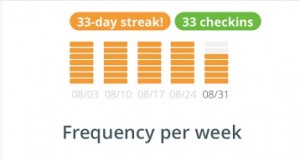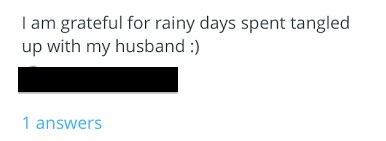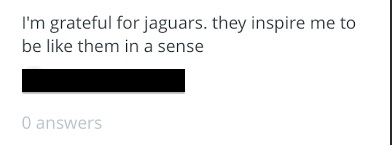 So get this: There’s actually an emotion that can help you resist the temptation of spending money.
So get this: There’s actually an emotion that can help you resist the temptation of spending money.
I recently read an article on how having a little bit of GRATITUDE can help us to spend less. The findings came from a study where a bunch of people were asked whether they’d like $54 today, or $80 in 30 days: a classic test of financial self-control.
But before they made their decision, the participants were asked to write down a personal experience that was either 1) happy, 2) emotionally neutral or 3) generated feelings of gratitude. The researchers found that the happy and neutral participants wanted the money now, but the grateful participants made the better decision by choosing the larger amount in the future. The researchers concluded:
“The emotion gratitude reduces impatience even with real money at stake.”
Woah, you mean I get to feel grateful, become more patient, AND I get to save money? Sounds like a plan.
So I decided to do a little LifeTest to see if it worked for me.
The LifeTest
I downloaded a free app called Lift – which helps you track your progress on any number of goals. The goal I picked was simple: I had to check-in every day and add a note stating one thing I was grateful for.
Every day at 7am, my phone buzzed and reminded me to check-in. And every day, I recorded one thing I was grateful for. It was as woo-woo as “I’m grateful for having simplicity in my life” or as inane as “I’m grateful that McDonald’s serves breakfast till 12 on weekends.” All that mattered was that I spent two minutes a day being thankful.
The awesome thing about Lift is that it really helps you to stick to your goal. According to Lifehacker, “Lift relies on psychology and the satisfaction you get of crossing off a day where you accomplished a task.” There’s a cool status bar displaying how consistent you are in your goal, which is super motivating to help you keep going:
Also, other people get to see your notes, which adds accountability. Some of the things that people are grateful for are mushy:
Today, I’m on a 33-day streak of being grateful for something – and I don’t plan on stopping.
But the key question is, did 33 days of gratitude help me to spend less?
The Results
After tracking every dollar I spent before and during my LifeTest, my conclusion was… no. It turns out that I spent roughly the same amount in both periods.
Does that mean the experiment failed? Not really. As you know, I don’t splurge very often – I literally go shopping for clothes once every five years – so there was limited scope for me to cut down on spending anyway.
But there were other unexpected benefits: I’ve started feeling more relaxed, more mindful, and much happier than I was last month. For example, I encountered a huge personal challenge last week that would have normally left me moping for days, but I managed to calmly deal with it within a couple of hours and move on. I’ve also started exercising more by going running three times a week, up from twice a week.
Gretchen Rubin, the author of The Happiness Project, wrote that grateful people feel more happy and satisfied with their lives. They even feel healthier and exercise more.
It’s hard to untangle correlation from causation, so I can’t say for sure that being grateful CAUSED this uptick in my mood and health. But hey, as long as life is a little happier, who cares what the root cause is? I’ll take correlation if it works.
How to Perform Your Own Gratitude Experiment
I’m gonna catch myself and acknowledge that this sounds like some New Age crap. Am I gonna start reading The Secret now? Am I becoming a frizzy-haired hippy?

It’s easy to be skeptical, and I don’t know for sure if it’ll work for you. But my point is, what’s the harm? It doesn’t cost anything besides 2 minutes a day, and it could potentially give your mood a boost. And if you’re spending too much now, it might even help you save some money.
If you’d like to perform your own gratitude experiment, here’s how:
- Pick a place to save a list of things you’re grateful for. It could be an app like Lift, a Google document, or just pen and paper.
- Pick a specific time to do it – like right after you wake up or after you shower at night. A habit is formed when there’s a specific “trigger” before it. Set a reminder on your phone if you need to.
- When your reminder goes off, write down ONE thing you’re grateful for. Start your sentence with “I’m grateful for…” or “I’m grateful that…”, then fill in whatever you want. It can be about small or silly things, conceptual things, world peace, char kway diao, whatever.
You can even start right now – leave a comment to let me know ONE thing you’re grateful for at this very moment. Don’t worry if it sounds silly or lame. Who knows? It might just make you happier, healthier and richer – in more ways than one.
P.S: As I blogged about earlier, becoming rich isn’t always about money. If you’d like learn about more ways to hatch a rich life, sign up for my VIP List!




Hi Lionel,
I have a gratitude journal but haven’t been able to honor it consistently(daily basis).
Just downloaded the Lift app and will use it right after recording my expenses on my phone every night.
Thanks for the heads-up!
I am grateful that I started a blog and is able to connect with like-minded individuals, especially after the meet-up last Friday!
You’re welcome! And thanks again for hosting – I’m super grateful that I got to hang with all these legendary bloggers such as yourself
Hah! Legendary?!
Nah. I am just a newcomer to this scene and I guess that if I didn’t host, I probably wouldn’t be invited to this gathering. ;p
Enjoyed your newest post. Will definitely be trying out Trello!
I hope you downloaded this because I mentioned it to you a while back!